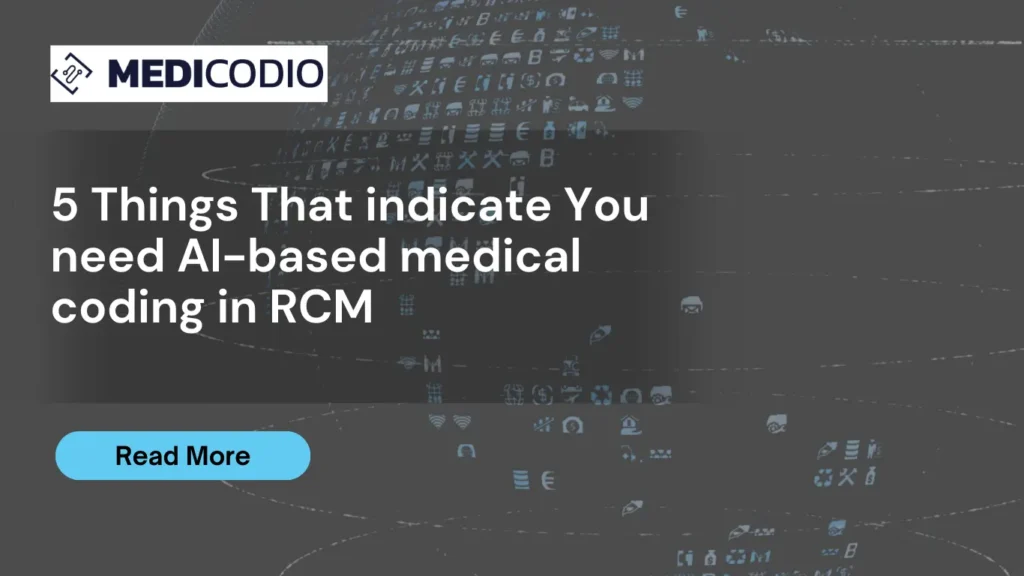In the realm of healthcare revenue cycle management (RCM), the integration of Artificial Intelligence (AI) has emerged as a transformative force, particularly in medical coding. AI-based medical coding in RCM streamlines processes, enhances accuracy, and alleviates the burden on healthcare professionals. Identifying the signs indicating the requirement for AI-driven solutions in medical coding is crucial for optimizing Healthcare RCM efficiency and precision.
-
- Increasing Coding Errors and Backlogs One of the primary indicators necessitating AI-based medical coding in RCM is a surge in coding errors and backlogs. Human-driven coding processes are susceptible to errors due to the complexity of medical coding guidelines and the ever-evolving healthcare landscape. A rising number of errors and backlogs signify the need for a more robust, accurate, and efficient solution. AI-powered coding systems employ machine learning algorithms capable of swiftly processing vast volumes of medical data, mitigating errors, and substantially reducing backlogs.
- Escalating Compliance Challenges As healthcare regulations evolve, compliance challenges become more intricate, demanding meticulous adherence to coding guidelines and standards. AI-based medical coding in RCM offers a proactive approach to navigate through these challenges. Advanced AI algorithms continuously update themselves based on the latest regulatory changes, ensuring accurate and compliant coding practices. Implementing AI-driven solutions helps healthcare organizations maintain compliance and mitigate the risks associated with regulatory non-compliance.
- Rising Operational Costs and Inefficiencies Mounting operational costs and inefficiencies in medical coding processes serve as a clear indicator for the adoption of AI-based solutions in RCM. Manual coding is time-consuming and labor-intensive, leading to increased operational expenses. AI streamlines coding workflows, significantly reducing operational costs by automating repetitive tasks, optimizing resource allocation, and accelerating coding procedures. The integration of AI mitigates inefficiencies, allowing healthcare organizations to allocate resources more effectively.
- Inadequate Revenue Capture and Billing Delays A decline in revenue capture and delays in billing are red flags signaling the need for AI-based medical coding in RCM. Human errors in coding can result in undercoding or overcoding, leading to revenue leakage. AI-driven coding systems enhance accuracy by ensuring appropriate code assignment, ultimately optimizing revenue capture. Moreover, AI expedites the coding process, reducing billing delays and accelerating the revenue cycle, thereby improving cash flow for healthcare providers.
- Scalability Challenges in Coding Operations Healthcare organizations experiencing scalability challenges in their coding operations can benefit significantly from AI-based solutions in RCM. Traditional coding methods struggle to cope with increasing volumes of patient data and coding requirements. AI-powered systems possess scalability features, capable of efficiently handling large datasets and scaling coding operations to meet growing demands. The flexibility and adaptability of AI technology enable healthcare institutions to manage expanding coding needs without compromising accuracy or efficiency.
- Stuck with old software whose nature is slowing down your progress: As you adopt new software, it swiftly becomes outdated. This is the reality of technology—a rapid race that can be expensive and often futile to keep up with. Outdated software can hinder your revenue cycle management (RCM) process, restricting your team and potentially leading to errors, eventually becoming a liability. The crucial question is: How can you stay competitive? The solution lies in collaborating with a specialized end-to-end provider proficient in innovative RCM technology. They handle the costs and implementation of cutting-edge tech, relieving you from the burden of falling behind. It’s a mutually beneficial solution where you gain without the stress.
Conclusion
In conclusion, the incorporation of AI-based medical coding in RCM presents a transformative opportunity for healthcare organizations to enhance operational efficiency, accuracy, and compliance. Recognizing the signs indicating the necessity for AI-driven solutions in medical coding is paramount for optimizing RCM processes and ensuring sustainable revenue cycles in the dynamic healthcare landscape.
By leveraging AI’s capabilities in medical coding, healthcare providers can streamline operations, mitigate errors, improve compliance, optimize revenue capture, and address scalability challenges, ultimately advancing toward a more efficient and effective healthcare revenue cycle management system.





